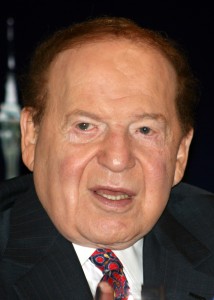Real Money Casino USA
Trusted Reviews, Bonuses, and Gambling News
Sands, Wynn and MGM Face Substantial Policy Changes in Macau
 Gaming mogul Sheldon Adelson (pictured) is facing two sets of very challenging circumstances in Macau, China. He shares the first set with Steve Wynn (Wynn Resorts, Limited) and MGM Resorts International. The three corporations are among six gaming license holders which Macau Chief Executive Fernando Chui advised of upcoming regulation reviews, and subsequent actions, prior to license renewal.
Gaming mogul Sheldon Adelson (pictured) is facing two sets of very challenging circumstances in Macau, China. He shares the first set with Steve Wynn (Wynn Resorts, Limited) and MGM Resorts International. The three corporations are among six gaming license holders which Macau Chief Executive Fernando Chui advised of upcoming regulation reviews, and subsequent actions, prior to license renewal.
Chui also called for a five-year plan to stabilize casino growth in an effort to develop economic diversity by creating non-gaming attractions, alleviating the need to rely on casino revenues. “The government will strive to adjust the pace without changing the momentum, seeking stable growth amid adjustments,” Chui said. He added that individual travel visas issued to visitors from Mainland China need better regulation to avoid overcrowding infringements on Macau residents.
The efforts to improve Macau’s residential life are creating complications for Adelson (Las Vegas Sands Corporation), Wynn (Wynn Resorts Limited) and MGM Resorts International. All three have multi-billion dollar plans moving forward, some which are scheduled to open in 2016. Wynn’s Wynn Palace will feature outdoor gardens and aerial transportation, while Adelson’s Parisian will boast a half-scale Eiffel Tower.
Governmental say-so can’t be avoided. Gaming industry regulation in Macau is legally based on administrative concession. In other words, private gaming entities have temporary contracts with China’s government. Gaming is considered a privileged activity which is part of the public economy. Casinos cannot operate unless the government expressly allows and supervises the venture.
Chui’s direction is in line with China President Xi Jinping, whose efforts to curtail corruption includes cracking down on junket operators supplying casinos with high-end baccarat business and curtailing illegal money transfers to gamblers. President Xi’s intent has deterred high rollers from visiting the former Portuguese colony (Macau returned to China in 1999). While under Portuguese rule, high rollers helped gaming industry revenues grow to be about seven times higher than Las Vegas Strip revenues.
President Xi’s and Chief Executive Chui’s objectives are blamed for a downturn in Macau’s casino industry. Revenues fell 2.6 percent in 2014, with analyst expectations forecasting a 30 percent drop by 2015’s end.
This is where Las Vegas Sand’s Corporation Operator Adelson faces additional complications. Steven Jacobs, former CEO for Sand’s Macau property, is suing Adelson. Hearings began in Nevada on Monday. According to Jacobs, Adelson issued illegal demands, including investigating government officials to gain information that could be used to “exert leverage.” According to Jacobs, Adelson fired him after he didn’t cooperate. Adelson denies the claims while Sands attributed Jacobs’ dismissal to violating company policy and working on unauthorized deals. In fact, Adelson is accusing Jacobs of instigating the investigations into government officials, claiming he didn’t know anything about the situation until after Jacobs was fired. Regardless, the court ordered Adelson to appear on the witness stand for questioning, despite his attempts to avoid appearing at all.
One can speculate that Adelson’s alleged request for information was intended to combat China’s changing policies. Casinos in Macau produce about two-thirds of Las Vegas Sand’s Corporation revenues. One can further speculate that President Xi is watching attentively.
